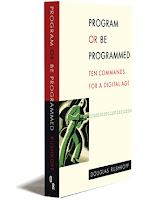Self-Directed Learning
One aspect of Digital Culture that I have really been interested in this semester has been the correlation between digital culture and our spiritual development. In my first post (here), I talked about how Rushkoff's idea that digital progression helps people come closer to God intrigued me. This idea also reminded me of Elder Bednar's talk from June 2010, titled "Things as They Really Are" (you can read that article here). Because of this post, Audrey Blake directed me to another article called "Focus and Priorities," by Elder Dallin H. Oaks (which you can read here). These were both enlightening articles that helped me understand how digital media can help (or hinder, as Elder Bednar argues) our relationship with God.
Another think that I grew really interested in because of this class was self-publishing. I wrote specifically about self-publishing with Amazon.com in this post, and I have read a lot about this new phenomenon. As someone who has not-so-secretly wanted to publish a book for a long time, this is really exciting. Because of that research, I have looked into other options for getting my works into public forums, to get some feedback for exmple (one website is webook.com).
Collaboration
I saw this quote on Pinterest as I was starting to put together all the segments of Chaotic Connections into one, cohesive Google Doc, and I thought this was extremely pertinent to our project. Our biggest fear going into this project was that there would be too many voices, and the book wouldn't make sense in the end. As I put together that final document for Chaotic Connections, I was specifically looking for major edits that would need to be done in order to make a cohesive story.In order to help with this problem, our group really wanted to have a very clear idea of where our group was going with our story. We all helped to smooth out the plot and the chapters, and I also took three of the final chapters to break into smaller segments for our writers. Developing the character of Jared also really helped to give our writers get some background for their segments. Our whole project was based on collaboration, and I feel like we all played a major role in pulling this project together.
Others' Assistance
There have been a few people in the class who have really motivated me throughout the class. The members in Project CCC were amazing: Jason Hamilton, Hillary Ulmer, Rebecca Ricks, Heather Anderson, and Christina Holt. They were the best partners to work with, and our group was really supportive of one another. Also, Tara Piña's blog was really informative and I loved her comments in class.
Digital Literacy
I'm used to browsing Facebook statuses, and honestly Google+ isn't that different. One thing that did help me with "Consuming" was learning about things such as RSS Feeds to bring everything into one place. Not only does this make consuming digital culture more efficient, but it also helps me to organize the things that I really want to read as opposed to the things that I'm just looking at. This moves into the idea of "Create." Learning to organize and cultivate a list of helpful/useful sites and sources has helped me see that digital culture can be used as more than just a way to pass the time. Using the blogs and Google+ was a great way to connect with my classmates on a deeper level. This was especially important in getting to know my group members. I got to see some of Christina's art, and I also discovered some of Jason's other blogs, for example. Having Google+ was a great way to continue conversations with other classmates that were barely covered in class, and it was really great to have a place to bounce ideas off of one another.
It's been a really interesting semester.



